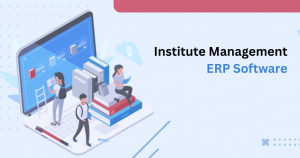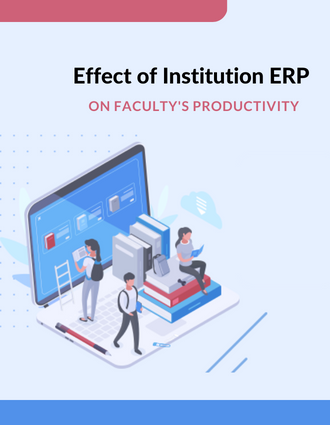More and more educational institutions use institution ERP software to improve their operations. These systems help things work faster, cost less, and simplify administrative tasks.
However, there hasn’t been enough research on how these systems affect teacher productivity. This study aims to fill that gap by examining how institution ERP affects teacher productivity. It is interesting to note that facilities at institutes are expected to fulfil multiple tasks in a day. Managing these activities while focusing on their teaching can certainly take a toll on their efficiency. A prolonged burden can sometimes also result in frequent mistakes and errors.
When we talk about a teacher’s workload, it includes many things like teaching and doing research. Institute management software makes it easier for teachers by providing real-time data insights.
How Does Institution ERP Software Impact Faculty’s Productivity?

Faculties at institutes often have to carry out numerous processes to achieve their outlined tasks. Marking daily attendance, keeping tabs on regular tests or managing fee records— all must be done in time. This is precisely where an ERP system can reduce the burden on faculties and automate processes.
Leveraging a dedicated ERP solution can help put administrative tasks in auto-pilot mode. This allows the faculty to focus on other crucial aspects of teaching instead of maintaining records. So here are some ways in which ERP software for school or educational institute impacts faculty’s productivity. Let’s take a look at them
1. Automated Attendance Management
Keeping track of who is in class is very important for students and teachers. However, it can take a long time in class, usually around 10-15 minutes. Teachers also have to spend extensive time keeping track of attendance records and calculating how many classes students have attended. These things take a lot of time.
Daily attendance management gets even more tiresome in the case of new joiners. Tracking individual records and making sure that attendance is marked accurately each day can eat up a lot of the faculty’s time and energy.
Fortunately, ERP for institute management can simplify attendance management by automating the process. By using RFID attendance systems, teachers can save a significant amount of time that would otherwise be spent on manual attendance tracking.
If a school doesn’t have a Biometric system, they can use education ERP solutions. These solutions have an online attendance system that lets teachers mark attendance using a mobile device, tablet, or computer.
This makes it easy for teachers to keep track of attendance and generate daily reports without having to write everything down. An institute management solution automates attendance tracking; teachers can save time and direct their efforts toward other important tasks like teaching and student support.
2. Efficient Administrative Management
ERP systems are designed to manage everything related to a student’s life at school. From when they apply to when they finish their courses and even when they look for jobs after school, ERP systems help them throughout their education.
Institute management ERP software provides a single platform for managing student data, which helps educational institutions build better relationships with their students.
Furthermore, education management systems help teachers and staff by taking care of time-consuming tasks. This means they don’t have to do everything themselves.
As a result, teachers can spend more time teaching and interact with students. This also allows higher-ups to make quicker decisions, making the educational institution run better.
3. Faster Fee and Bill Payments
Online payment has become a preferred mode of transaction in various sectors, including education, in the current era. Schools and colleges get many types of payments, like fees for admission, tuition, boarding, and registration for exams.
To simplify financial transactions, an ERP for institute management can digitize fee and bill payments. This makes it a mere cakewalk for students and staff to manage their financial records.
Additionally, the system can send alerts for due fee payments, which students can receive through the student portal. Students can access receipts and important documents from their portals through this feature.
Additionally, the ERP system can create reports in different formats per student, per class, per year, and per session. This helps educational institutions to keep regular track of payment details and provide accurate reports.
The alert feature reminds students to make payments on time. Additionally, the system’s report-generating ability helps track payment details.
4. Prompt Decision Making
Institute management software provides faculty members with immediate access to important data and analytics, helping them make informed decisions quickly.
An ERP system can provide faculty with information and analysis on student performance. It also includes course enrollment, resource allocation, and finances.
This information can help them make decisions, such as adjusting course schedules and identifying areas for improvement. It makes the best use of resources as well. As a result, faculty can make informed decisions and take corrective actions promptly. This is effective in improving overall productivity.
5. Enhanced Resource Management
Institute management software makes it easier to manage educational institutions by putting all their departments and processes on one platform. This system helps keep track of everything in real time.
It helps organize important information like classroom details, teacher availability, transport records, student data, stationery, hostel information, and institute property all in one place.
Additionally, it allows for generating reports and sharing them with other departments when needed. By using automation, resource management becomes faster, more efficient, and easier to manage.
Wrapping Up
So, this was all you needed to know about the impact of institute management ERP software on faculty productivity. The initial implementation cost of education ERP software may seem expensive, but it can lead to significant cost savings for a higher return on investment (ROI) for educational institutions.
You may see a significant shift in the productivity of faculties with the ERP system in place. It can help them become more efficient and focus more on teaching, which is their primary job role. Additionally, happy teachers with a lesser burden of doing administrative tasks will lead to better classroom environments. This will eventually result in an enriching atmosphere for students.
Proctur can help you get started with the best-in-class ERP solution that best meets your diverse requirements.



